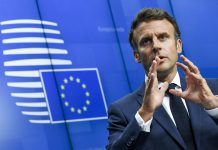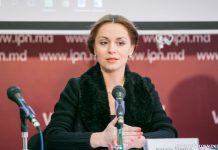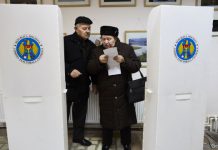The "Big Daddy" of U.S. Democratic Party politics in the 1960s and ’70s, Jesse Unruh, had a wonderfully ribald saying about the role of money and influence in the business of government: "If you can’t drink a lobbyist’s whiskey, take his money, sleep with his women, and still vote against him in the morning, you don’t belong in politics."
Moldova’s Big Daddy, acting President Vladimir Voronin, recently held meetings in Moscow with vastly bigger daddies: Russian President Dmitry Medvedev and Prime Minister Vladimir Putin. Voronin expressed gratitude for the Kremlin’s singular support of Moldova’s Communists following the chaos and violence after the April 5 elections and reiterated his view that "colored revolutions" and "foreign interference" have no place in the Republic of Moldova.
In return for this seeming fealty, Voronin arrived home to announce massive Russian financial support for Moldova just one month before the controversial repeat parliamentary elections scheduled there for July 29.
Voronin described the half-billion-dollar loan as a "political decision" by Moscow. Although the details will be "discussed by experts" later on, Voronin quickly suggested the money would go to repairing and building roads, gas grids, irrigation networks, and "finishing houses," whatever that might mean.
For his part, Putin said, "We believe it’s possible…the first tranche [of $150 million] could reach Moldova within the next six weeks or two months." At the same time, Putin made a powerfully symbolic gesture in granting $20 million for the reconstruction of Moldova’s burned-out parliament, the destruction of which during the April postelection rioting angered Moldovans of all political persuasions. And as a bonus, Russia apparently lifted all previous restrictions on agricultural exports from Moldova.
EU Outmaneuvered
Voronin and Putin have used this visit and this announcement to tactically outmaneuver their respective rivals once again. Just as before the April elections, when Russian Foreign Minister Sergei Lavrov bucked up the Moldovan Communists with his first visit to Chisinau in eight years, with this trip Voronin has shown himself to average voters as a man of action who is respected by serious leaders and brings home the bacon.
No matter that the first dollar won’t be dispatched, if at all, until after the Moldovan elections, because the implicit hint to the electorate is that "if you vote for the Communists, you will get your house finished."
By conditioning the money on the outcome of the vote, Moscow has essentially secured a free option on Voronin and his Communists’ mini-vertical of power, while at the same time blowing wind into their sails for the campaign.
If they win, the Russian money flows and then the Kremlin exacts its yet-unknown price, which may include something as comprehensive as a Transdniester settlement along the lines of the 2003 Kozak memorandum or piecemeal elements like military basing rights in Transdniester, Russian as an official state language in Moldova, or assurances that under no conditions will the European Union Border Assistance Monitoring Mission be renewed. If the opposition somehow prevails, then the money spigot is turned off and both Voronin and Putin blame the policies of the new government for alienating Russian help.
Much as in Pikalyovo recently, Putin has swooped in to save the day with timely financial intervention. Only this time the whipping boy was not a down-on-his-luck oligarch strangling a one-company town, but, by implication, the EU’s entire brand-new Eastern Partnership, launched on May 7. Russia has shown itself to be far more flexible and responsive to "eastern partner" Moldova than Brussels, and without all those vexing human rights obligations and endless EU technical reporting requirements to file.
Faced with the biggest upheaval in Moldova since the Transdniester conflict itself, the EU has essentially ceded the field. While Putin has offered loans equaling about 12 percent of Moldova’s gross domestic product during the depths of a world economic crisis, the best the EU could muster recently was encouragement that Moldova continue to reform its legal system. While without doubt a vital step, such "concrete ideas for enhancing our relationship" (as the Eastern Partnership website contemplates) need to be matched with equally concrete, sustained, hands-on help.
Turning East, For Now
Putin’s bold financial move also contrasted dramatically with the departure of the International Monetary Fund (IMF) from Moldova in early June. Citing "instability" in the country and the "provisional character" of the current government, the IMF decided to postpone until fall negotiations on a new financial program for Moldova.
Voronin, with Russian aid securely in his pocket, let loose with the kind of earthy comments that are increasingly characterizing his public statements. He claimed that the IMF left Moldova "as a woman leaves her husband who is acting badly," adding that "this is the second time that they are going…. They left in 2001 and then they returned in 2004 and asked how we achieved such success. We managed because you were not here. They thought we’d just roll over and die. Someone else here is calling the shots."
This last comment was a parting slap not only at Brussels, but at Washington, which has also been remarkably quiet on Moldova. This appears to be due to delays in assembling President Barack Obama’s foreign-policy team, the rhetoric of "reset," and careful calibration in advance of the Obama-Medvedev meeting in Moscow in July. Whatever the reason, the Kremlin has noticed it and is acting accordingly.
But anyone who thinks Voronin’s latest turn to the east portends a permanent shift should take a close look at recent history. In the last eight years, Voronin has already tacked back and forth several times between Russian orientation and European integration. He was elected in 2001 on a pro-Russian platform that included joining a joint customs union, making Russian an official state language, and several positions that would surface in the Kozak memorandum.
Then in late 2003, under great pressure from the Organization for Security and Cooperation in Europe’s chairmanship and others, he killed the Kozak memorandum — a very difficult decision that likely went against his instincts and preferences. This led to several years of pro-European jaw-boning as Russian troop and armament withdrawals stopped.
But there was little concrete action on reform as Chisinau shopped around its own comprehensive "package" plan for Transdniester settlement to the Kremlin. When it became abundantly clear that this approach wasn’t going to fly and with elections approaching, Voronin, ever mindful of remaining relevant in the face of term limits, bent again toward Moscow.
So if Voronin stays in power, it shouldn’t be surprising if down the road he changes vectors again. After all, as the Kremlin often reminds, it is a multipolar world. Time will tell whether, like Big Daddy Unruh, Vladimir Voronin has the fortitude to look a man square in the eye, take his money, and then vote against him."
Louis ONeill was White House fellow to Secretary of State Colin Powell from 2004 to 2005 and OSCE ambassador and head of mission to Moldova from 2006 to 2008. The views expressed in this commentary are the author’s own and do not necessarily reflect those of RFE/RL






